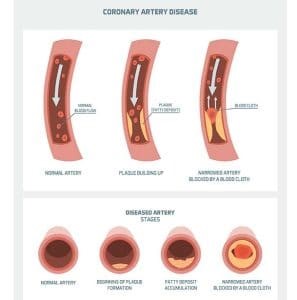Contact us at 502-588-7010.
Cholesterol is a waxy substance found in your blood. Your body needs cholesterol to build healthy cells, but high levels of cholesterol can increase your risk of heart disease. When your cholesterol levels are high, you can develop fatty deposits in your blood vessels. Eventually, these deposits grow, making it difficult for enough blood to flow through your arteries. Sometimes, those deposits can cause fatal blockages, break suddenly and form a clot, or cause a heart attack or stroke.
High cholesterol can be inherited, but it's often the result of unhealthy lifestyle choices. Prevention and treatment are key to staying healthy. A proper diet, regular exercise and sometimes medication can help reduce high cholesterol.
Cholesterol is carried through your blood, attached to proteins. Lipoproteins are a combination of proteins and cholesterol. There are different types of cholesterol, based on what the lipoprotein carries. They are:
- Low-density lipoprotein (LDL). LDL, the "bad" cholesterol, transports cholesterol particles throughout your body. LDL cholesterol builds up in the walls of your arteries, making them hard and narrow.
- High-density lipoprotein (HDL). HDL, the "good" cholesterol, picks up excess cholesterol and takes it back to your liver.
Because high cholesterol has no symptoms, a blood test is the only way to detect if you have it.
 A lipid profile also typically measures triglycerides, a type of fat in the blood. Having a high triglyceride level also can increase your risk of heart disease.
A lipid profile also typically measures triglycerides, a type of fat in the blood. Having a high triglyceride level also can increase your risk of heart disease.
Factors you can control — such as inactivity, obesity and an unhealthy diet — contribute to harmful cholesterol and triglyceride levels. Factors beyond your control might play a role, too. For example, your genetic makeup might make it more difficult for your body to remove LDL cholesterol from your blood or break it down in the liver.
Screening & Diagnosis
Cholesterol screenings are recommended for men ages 45 to 65 and for women ages 55 to 65 every 1-2 years. People over 65 should receive cholesterol tests annually.
If your test results aren't within desirable ranges, your doctor might recommend more-frequent lab work and review. Your doctor might also suggest more-frequent tests if you have a family history of high cholesterol, heart disease or other risk factors, such as diabetes or high blood pressure.
Managing the unmanageable:
You may be genetically prone to high cholesterol, and therefore, at higher risk for heart attacks or stroke. Or perhaps you have high cholesterol but do not respond to statins or other traditional medications or lifestyle changes.
Factors that can increase your risk of unhealthy cholesterol levels include:
- Poor diet. Eating too much saturated fat or trans fats can result in unhealthy cholesterol levels. Saturated fats are found in fatty cuts of meat and full-fat dairy products. Trans fats are often found in packaged snacks or desserts.
- Obesity. Having a body mass index (BMI) of 30 or greater puts you at risk of high cholesterol.
- Lack of exercise. Exercise helps boost your body's HDL, the "good," cholesterol.
- Smoking. Cigarette smoking may lower your level of HDL, the "good," cholesterol.
- Alcohol. Drinking too much alcohol can increase your total cholesterol level.
- Age. Even young children can have unhealthy cholesterol, but it's much more common in people over 40. As you age, your liver becomes less able to remove LDL cholesterol.

UofL Physicians – Cardiology uses a multidisciplinary approach to treating high cholesterol. Our Advanced Lipid (Cholesterol) Clinic team helps you identify and reduce your risk factors through individualized treatment plans, as well as nutrition and exercise counseling.
Access to the latest testing and clinical trial treatments:
The clinic allows you to gain access to advanced diagnostics and therapies, such as genetic testing and counseling, PCSK9 inhibitors and new clinical trials focused on Lp(a) therapeutics, familial chylomicronemia syndrome and other genetic disorders. You will also have access to the latest trials as we remain a leader in lipid research and new therapies.
Coronary Artery Calcium Scanning may be ordered to help determine the degree of buildup in your vessels. A coronary calcium scan is a specialized heart scan or X-ray test that provides pictures of your heart that can help your doctor detect and measure calcium-containing plaque in your arteries.
Schedule a consultation with us if any of the following is true:
- You have not been able to lower your cholesterol levels with medications, diet or exercise
- You are at high risk for a cardiovascular event, especially if you are genetically prone to high cholesterol
- You have a cholesterol or genetic lipid disorder, such as dyslipidemia syndrome, familial hypercholesterolemia, hypertriglyceridemia or primary low-HDL syndrome


